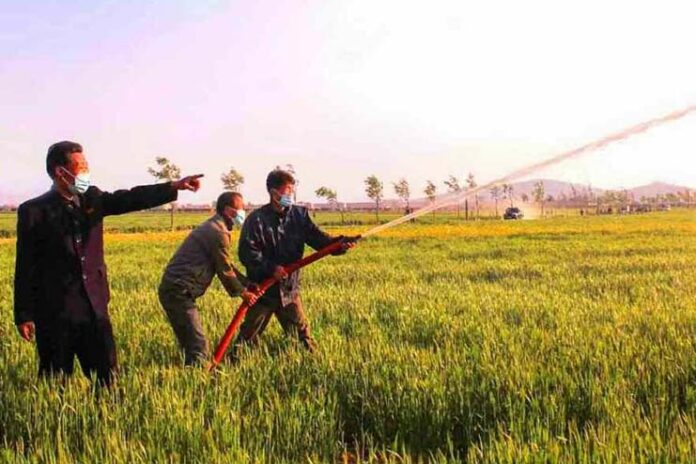
North Korea’s COVID-19 outbreak is causing difficulties in the country’s efforts to mobilize people to plant crops and only limited government support is being provided to agricultural villages due to local lockdowns.
A source in South Pyongan Province told Daily NK on Tuesday that “students, soldiers, and workers are heading in groups to agricultural villages to work the fields, but they alone aren’t enough for the labor required.”
Almost everyone in North Korea stops what they are doing every May when the planting season rolls around, heading to agricultural villages to lend a hand with farming activities. This year, however, the authorities have been unable to send a sufficient amount of laborers to rural areas like in years past due to regional lockdowns.
“Prior to the COVID-19 outbreak, the authorities had managed to mobilize everyone as planned, but now they can’t send all those who are needed at the farms,” the source said. “With inter-regional travel completely banned along with the strengthening of controls and surveillance, farm mobilizations across provincial, city and county boundaries have been suspended, and local authorities have to rely on labor solely from within their own districts.”
In short, after North Korea declared the implementation of a “maximum emergency epidemic prevention system” and implemented lockdowns around the country, interregional labor mobilizations have not been happening as they should. This appears to have led to labor shortages in agricultural areas of the country.
In fact, North Korean agricultural villages have been dealing with labor shortages since March. This is when farming villages would need to prepare for the farming season, but many people were unable to take part in preparations because of economic hardships.
In the wake of inter-regional travel bans imposed due to the COVID-19 outbreak, the agricultural labor shortage has grown even worse.
Indeed, the source said that authorities cannot fulfill their mobilization targets these days. “Since they can’t forcibly mobilize people, they aren’t able to send enough people to the farms,” he said.
Moreover, the source said many people are avoiding the mobilizations, adding that “everyone is trying to skip out using COVID-19 as an excuse.”
He noted that the failure to mobilize sufficient labor to farms is causing major problems for planting crops.
Most farms in North Korea are not mechanized, so people have to do the planting manually, the source said. “However, since there are no people to work, it will be virtually impossible to finish the planting on time,” he added.
Moreover, due to a lack of vinyl film, seed beds are suffering from severe cold damage, and with the added drought, the young rice plants are not growing enough to plant.
“Planting efforts are facing problems, but the party just tells people to make up for the lack of fertilizer, agricultural chemicals and vinyl film through self-reliance,” he said. “They have no measures to deal with drought or cold damage.”
Suffering from labor shortages, natural disasters and even supply shortages, North Korea is expected to fall far short of its agricultural production targets this year.
Meanwhile, the country is forcing tight quarantine protocols on people who are lending support to agricultural villages.
According to the source, the government has set up quarantine checkpoints and is checking the temperatures of people who have been mobilized to the farms.
The authorities have also ordered people to “sanitize using salt water and to wear masks,” he added.
Translated by David Black. Edited by Robert Lauler.
Please direct any comments or questions about this article to dailynkenglish@uni-media.net.


















